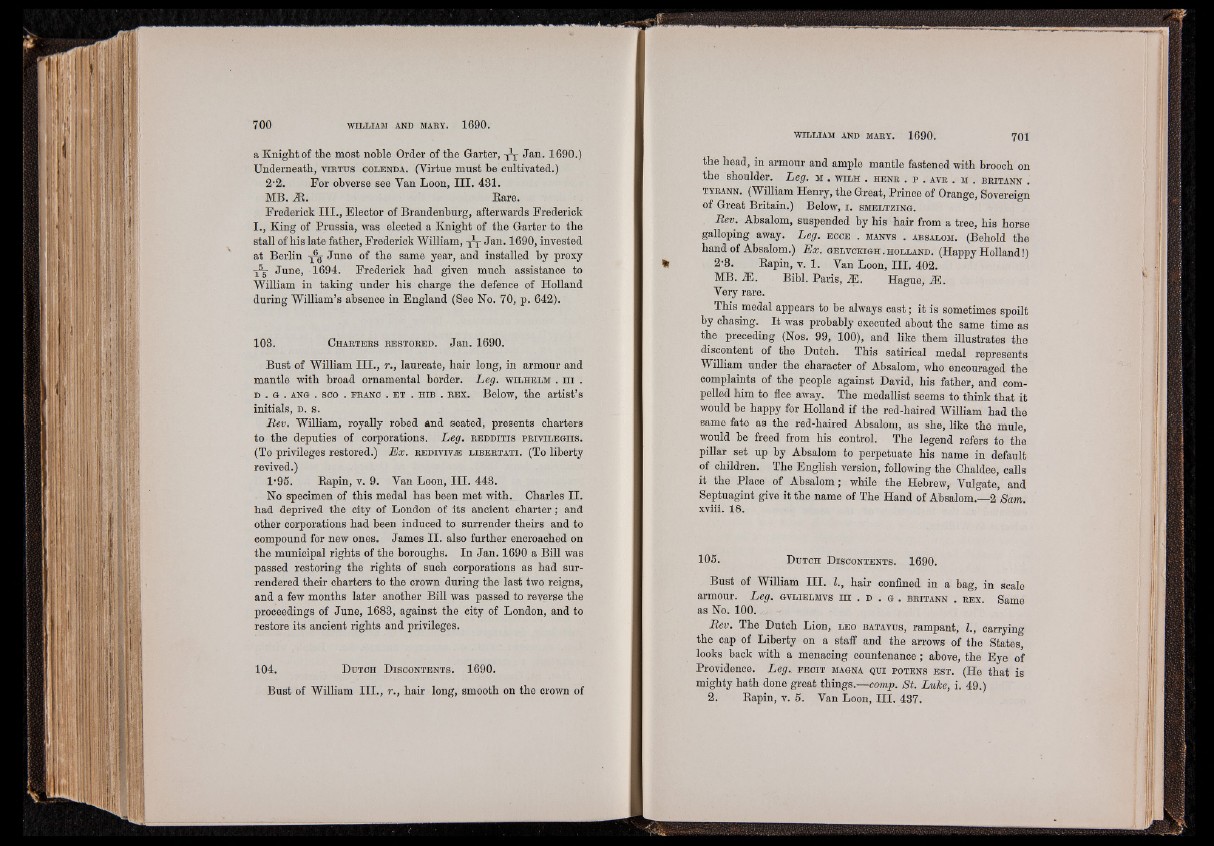
a Knight of the most noble Order of the Garter, .-A Jan. 1690.)
Underneath, v ir t u s c o l en d a . (Virtue must he cultivated.)
2*2. For obverse see Van Loon, III. 481.
MB. .Si. Rare.
Frederick III., Elector of Brandenburg, afterwards Frederick
I., King of Prussia, was elected a Knight of the Garter to the
stall of his late father, Frederick William, A Jan. 1690, invested
at Berlin A June of the same year, and installed by proxy
-A June, 1694. Frederick had given much assistance to
William in taking under his charge the defence of Holland
during William’s absence in England (See No. 70, p. 642).
103. C h a b t e b s e e s t o e e d . Jan. 1690.
Bust of William III., r., laureate, hair long, in armour and
mantle with broad ornamental border. Leg. w il h e lm . h i .
d . G . a ng . sco . p e a n c . e t . h ib . BEX. Below, the artist’s
initials, d. s.
Rev. William, royally robed and seated, presents charters
to the deputies of corporations. Leg. b e d d it is p b t v il e g i is .
(To privileges restored.) Ex. BEDrvrv.® l ib e b t a t i . (To liberty
revived.)
1‘95. Rapin, v. 9. Van Loon, III. 443.
No specimen of this medal has been met with. Charles II.
had deprived the city of London of its ancient charter; and
other corporations had been induced to surrender theirs and to
compound for new ones. James II. also further encroached on
the municipal rights of the boroughs. In Jan. 1690 a Bill was
passed restoring the rights of such corporations as had surrendered
their charters to the crown during the last two reigns,
and a few months later another Bill was passed to reverse the
proceedings of June, 1683, against the city of London, and to
restore its ancient rights and privileges.
104. D u t c h D is c o n t e n t s . 1690.
Bust of William III., r., hair long, smooth on the crown of
the head, in armour and ample mantle fastened with brooch on
the shoulder. Leg. m . w il h . h e n b . p . avb . m . b e it a n n .
tybann. ("William Henry, the Great, Prince of Orange, Sovereign
of Great Britain.) Below, i. sm e l t z in g .
Rev. Absalom, suspended by his hair from a tree, his horse
galloping away. Leg. e c c e . manvs . absalom. (Behold the
hand of Absalom.) Ex. g e l v c k ig h . Ho l la n d . (Happy Holland!)
2-3. Rapin, v. 1. Van Loon, IH . 402.
MB. JE. Bibl. Paris, M. Hague, M.
Very rare.
This medal appears to be always cast; it is sometimes spoilt
by chasing. It was probably executed about the same time as
the preceding (Nos. 99, 100), and like them illustrates the
discontent of the Dutch. This satirical medal represents
William under the character of Absalom, who encouraged the
complaints of the people against David, his father, and compelled
him to flee away. The medallist seems to think that it
would he happy for Holland if the red-haired William had the
same fate as the red-haired Absalom, as she, like the mule,
would be freed from his control. The legend refers to the
pillar set up by Absalom to perpetuate his name in default
of children. The English version, following the Chaldee, calls
it the Place of Absalom; while the Hebrew, Vulgate, and
Septuagint give it the name of The Hand of Absalom.—2 Sam,.
xviii. 18.
105. D u t c h D is c o n t e n t s . 1690.
Bust of William II I. I., hair confined in a bag, in scale
armour. Leg. g v l ie lm v s h i . d . g . b e it a n n . b e x . Same
as No. 100.
Rev. The Dutch Lion, l e o batavus, rampant, I., carrying
the cap of Liberty on a staff and the arrows of the States,
looks back with a menacing countenance; above, the Eye of
Providence. Leg., f e c i t magna q u i po t e n s e s t . (He that is
mighty hath done great things.—comp. St. Luke, i. 49.)
2. Rapin, v. 5. Van Loon, III. 437.